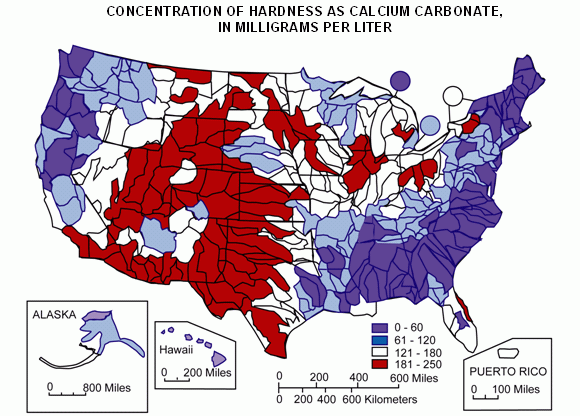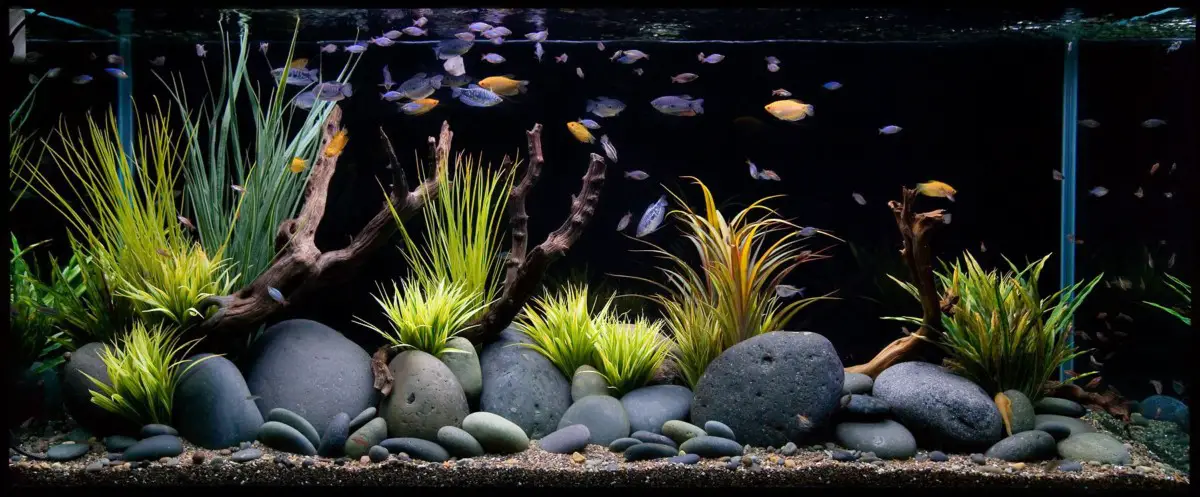Measuring Hardness (GH) in fish aquariums is tested in a few different ways as degrees or another is ppm (parts per million or mg/l) fish from certain parts of the world come from water that has a different level of hardness in the environment they thrive in while others thrive in softer water tested as Carbonate Hardness (KH), also referred to as alkalinity. If fish are accustomed to certain levels, then that’s what you need to replicate. Is Hard Water Bad for Fish?
In general, No-(GH) can be harmful to certain fish when the water’s pH levels are elevated especially
If the fish are native to soft or acidic waters.
Extreme hardness(GH) affect:
pH control
Acidification
Bacteria on Bio-Filters
Fish breeding & egg-laying
Colorization
Infections & Fungi
Stress & disease
General hardness, also known as water hardness, is referred to as GH for short. It’s basically the measure of the many salts that are dissolved in your water. In particular, calcium and magnesium while KA is a measure of carbonate ions, Bicarbonates hardness.
Is Hard Water Bad for Fish
Water that is low (GH) which stands for General Hardness is referred to as soft water and water that is hard has a higher GH. If you deal with water chemistry as a pool owner or run an aquarium it’s important to keep up with the overall condition of your water. There are basics you need to know about and being that fish are involved in the operation of an Aquarium the results of not keeping up with that knowledge could be costly.
Part of the job of an Aquarium hobbyist is keeping your tank clean and chemically correct and your fish thriving. Even if your fish adapt to the water you are using in your tank they may not be healthy and happy or “Thriving” Before you attempt to change the chemistry of the water you use in your tank take some time and see what the specifications for the type of fish you’ll be keeping in your Aquarium.
Some fish do well or even prefer hard water to live in. When measuring the hard water for fish, it’s referred to as either degree of hardness (DH) or as parts per million (ppm). A degree of General Hardness (DH) is defined as 10 mg/L CaO, which is equivalent to 17.85 ppm.
When the (DH) or degree of hardness is 0 to 6 and the ppm is 0 to 100, the water is soft or very soft. When the water’s DH is 6 to 25 and the ppm is 101 to 449, it’s slightly hard to hard. When (DH) is 30 or more and the ppm is 450 or more, the water is considered “liquid rock,” or very hard. A lot of Aquarium fish have the next for adapting to certain water conditions meaning the chemistry of the water.
The odds of you buying a fish that’s not from your area and is not used to the water’s chemistry is pretty high. Most species are hardy enough for you not to be overly concerned about it. Fish that are comfortable and thrive in Hard water is
- Livebearers such as Guppies, Mollies, Platies, and Swordtails
- Paradise Fish
- African and some Central American Cichlids
- Brackish fish such as Archers, Monos, and Scats
When you start an Aquarium or want to add fish start by asking your Pet Shop Dealer about the PH and GH of the species that will keep the fish close to their natural environmental habitats PH, DH, or temperature. There is also the case where a fish’s natural environment specifications wouldn’t matter because the fish was captive-bred in hard water conditions so it won’t make a big difference. That would be the call of the Pet Shop to give you this valuable information.
Is Well Water Safe for Fish
Water Hardness or (GH) can simply be described as water with high mineral content. Hard water has a high dissolved mineral content while Soft water has low dissolved mineral content. The most common of these minerals that are found in potable water is Calcium. Depending where you are in the country is dependent on how hard or soft your Private Well water is. Well, water from areas that have a lot of limestones (calcium) is often hard. Water that comes from lakes and rainwater is often devoid of minerals, making it soft.
For example, states like Florida and Arizona have very hard groundwater while states like New York and Colorado have very soft water. Tap water is generally tested and those results can be easily available to anyone that desires them. That’s the law. Unfortunately, Private Well is not and that would be your responsibility to have yours tested periodically which if you are not well then, you should be having done.
The results for GH and KH can be attained and all kinds of parameter testing can be done. You can use a reliable pool tester and get the basic results you need for information on hardness. You can always adjust it too. Important factors play key roles with each other and go hand in hand with some results like pH and high mineral content.
Important factors play key roles with each other and go hand in hand with some results like pH and high mineral content.
High Hardness in water can go hand in hand with high PH just as Low Hardness in Soft Water goes hand in hand with low PH or acidic water either one can be harmful on the extremes and need to be adjusted. The minerals in hard water act as a buffer that combats acidification in the water. This scenario can affect the PH maintenance of your Aquarium.
The pH is harder to adjust because of the number of minerals in the water. The resulting water will be more alkaline and higher in pH. Some species of fish require hard water while others require soft. Hardness is a property of water that is not a health concern, but it can be a nuisance and it could be unhealthy for fish in your Aquarium.
Water systems or Wells using groundwater as a source are concerned with water hardness since as water moves through soil and rock it dissolves small amounts of naturally-occurring minerals and carries them into the groundwater supply.
Coming from a background in Chemistry and Biology I would recommend that everyone who is keeping an Aquarium take a very basic course on Life Sciences to try and understand the simple basic concepts of a healthy water system and stable water chemistry. It will turn on the light and everything will click. Instead of treating your tank water to accommodate your fish, you can simply buy fish that can accommodate whatever water is available in your neck of the woods and make it their own or somewhere in the middle.
Soft Water Aquarium Fish
Most tropical fish will survive in the average water from our tap as long as chlorine and chloramine are removed with no problems. Unless you test aquarium water hardness and notice that you have extremely hard aquarium water or extremely soft aquarium water you should be just fine.
Get the information from the Tropical Fish Profiles and if it says the fish you really want to raise and keep must have soft water and your water from the tap is very hard, your fish may become sick, or even die. Some fish will adapt just fine. Some won’t. Some will develop problems with breeding or colorization and this will be due to the water’s overall General Hardness. So do your homework.
Soft water exists wherever water is flowing across terrain that is poor insoluble minerals. Thus water has no contact with minerals for water to dissolve then the water has less hardness. The rivers of South America, Southeast Asia, and West Africa are predominantly rivers of this type. Because so many of the ornamental fish sold in the trade come from these areas, many hobbyists assume that they need or prefer soft water conditions in the aquarium.
Up to a point, this is indeed the case, but creating and maintaining a soft water aquarium places an extra set of challenges on the aquarist. These are as follows:
- Soft Water Aquariums are much harder to maintain and as a consequence PH will suffer and the fish will suffer directly because of PH suffering.
- Cost of Keeping Soft Water Aquarium-Reverse-osmosis filters at the tap will provide soft water but at a price. Collecting rainwater is a practically zero-cost alternative, but it is not without problems of its own.
- Domestic water softeners do not produce soft water that is usable in an Aquarium. All they do is replace limescale-forming minerals with minerals that don’t form limescale. This is fine for washing machines and dishwashers, but bad for fish tanks.
- Bacteria on Tank Filters work better with water that contains hard alkaline properties.
- Fish can also be plagued with more infections and fungi that multiply in softwater environments
- Most fish will naturally thrive in hard water aquariums, but the reverse is not always true Tetras, Barbs, Gouramis, Corydoras catfish and Angelfish are all examples of originally soft water fish that are routinely and successfully kept in hard water community tanks. But Livebearers, Central American cichlids, and Rift Valley cichlids almost never adapt to soft and acidic water conditions But Livebearers, Central American cichlids, and Rift Valley cichlids almost never adapt to soft and acidic water conditions. In other words, if all you want is a mixed community tank, then hard and alkaline water will allow you to mix Platies, Neons, and Corydoras without problems.
Some fish need soft acidic water to breed and lay their eggs. If they do then if the water chemistry is not correct the eggs won’t hatch. Then 2 tanks will be needed. So there will be some instances. Expect lower pH and the problems that come with it. In a Hard Water aquarium, the alkalinity reserve outweighs potential sources of acidity but in Soft Water insufficient alkalinity allows rapid acidification where rapid pH reduction can happen.
How to Soften Aquarium Water
If you live in a soft water area you may have the water of appropriate pH and hardness for a soft water aquarium. Maintenance of the aquarium will be relatively easy because you can perform large and regular water changes, thereby minimizing any problems with water quality or acidification.
You can also add soft water through a Reverse Osmosis Water Filter or Distilled Water mixing the content with a hard water source if that’s is your case in whatever part of the country you are in. RO water is considered pure water without the minerals that are normally found in Hard water.
Because soft water is poor in minerals, various trace element supplements are produced for aquarists keeping soft water aquariums. These supposedly help the health of the fish and are simply added to each new batch of water. Whether or not they are useful will depend on how soft the water is that you are using.
If you are mixing pure water with hard water to create something around the 5-10Ë° DH mark suggested, there is unlikely to be any shortfall in the amount of these trace elements available. But if you are keeping your fish in water that is softer than this, then adding mineral supplements may make sense. There are several ways you can soften hard water if necessary, including:
- Water-softening pillows-There is several different makers of water-softening pillows that you can install in your aquarium filter. These pillows work well for smaller aquariums, but do not do that good of a job with large aquarium tanks.
- Peat-Peat is often used by tropical fish keepers to help soften the water. Many still put the peat in their aquarium filter so that the water flows through the peat and back into the tank. Others prefer to get a large container or bucket and soak the peat for 1-2 weeks. Many put the peat in a pillowcase and submerge it in a bucket of water. You will need to add an airstone so the water is aerated and constantly moving. Boil the peat first to remove any contaminants. Ensure you purchase pure peat with no additives
- Driftwood-Adding Driftwood will help soften water in your Aquarium. To clean larger pieces, pour boiling water over the wood and when it cools, scrub with a brush. Driftwood will release tannins in your tank’s water. This will not hurt your fish but will stain your water and make it look brownish. You may want to soak your driftwood in a separate container for several weeks before putting it in your tank.
On the other hand, if you find that your water is far too soft, there are ways to harden it, too, including:
- Crushed coral or oyster shell-Adding crushed coral to your tank will help increase the aquarium water hardness. Aquarium owners sometimes choose to fill filter media bags and add crushed coral or oyster shells to their filters. Some choose to use crushed coral as their substrate instead of gravel.
- Limestone-Using limestone allows for calcium and other minerals to leach out into the water column. Using limestone rocks also provides shelter for your tropical fish. The most popular limestone used in cichlid tanks is Texas Holey Rock Limestone.
- Buffer additives-There are several buffers on the market that will help raise GH and KH while maintaining the pH of the aquarium water. Most use a combination of different salts including carbonate salts to increase aquarium water hardness. Ensure that you follow the directions on the manufacturer’s label.
If you use any sort of extras to harden or soften the water, ensure that they’ve been cleaned thoroughly, so it doesn’t do more harm than good. Whatever you put into the tank will end up in your fish.
JimGalloway Author/Editor

References: LiveAquaria-Basic Water Chemistry Part 1: Water Hardness
